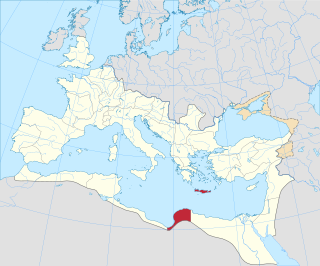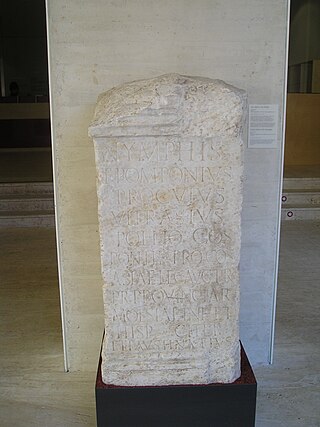Related Research Articles

Crete and Cyrenaica was a senatorial province of the Roman Republic and later the Roman Empire, established in 67 BC, which included the island of Crete and the region of Cyrenaica in modern-day Libya. These areas were settled by Greek colonists from the eighth to sixth centuries BC. After Alexander the Great's death, his short-lived empire was partitioned between his generals during the Wars of the Diadochi. Cyrenaica ended up under Egyptian rule, except for Crete, which remained independent.
Quintus Vibius Secundus was a Roman Senator who was active during the reigns of Domitian and Trajan. He was suffect consul for the nundinium of March to April 86.

The gens Vibia was a plebeian family at ancient Rome. Although individuals named Vibius appear in history during the time of the Second Punic War, no members of this gens are found at Rome until the final century of the Republic. The first of the Vibii to obtain the consulship was Gaius Vibius Pansa in 43 BC, and from then until imperial times the Vibii regularly filled the highest offices of the Roman state. The emperors Trebonianus Gallus and Volusianus each claimed descent from the family.

Titus Pomponius Proculus Vitrasius Pollio was a Roman senator, who held several imperial appointments during the reign of Marcus Aurelius. He was suffect consul in an undetermined nundinium around 151; he was a consul ordinarius in the year 176 with Marcus Flavius Aper as his colleague.
The gens Sextia was a plebeian family at ancient Rome, from the time of the early Republic and continuing into imperial times. The most famous member of the gens was Lucius Sextius Lateranus, who as tribune of the plebs from 376 to 367 BC, prevented the election of the annual magistrates, until the passage of the lex Licinia Sextia, otherwise known as the "Licinian Rogations," in the latter year. This law, brought forward by Sextius and his colleague, Gaius Licinius Calvus, opened the consulship to the plebeians, and in the following year Sextius was elected the first plebeian consul. Despite the antiquity of the family, only one other member obtained the consulship during the time of the Republic. Their name occurs more often in the consular fasti under the Empire.
Lucius Hedius Rufus Lollianus Avitus was a Roman senator and military officer. He was consul in the year 144 as the colleague of Titus Statilius Maximus.
Titus Sextius Magius Lateranus was a Roman Senator who lived during the second half of the 1st century and first half of the 2nd century. Lateranus served as a consul ordinarius in 94 as the colleague of Lucius Nonius Calpurnius Torquatus Asprenas. He is known entirely from inscriptions.
Titus Sextius Cornelius Africanus, also known as Titus Sextius Africanus, was a Roman Senator who lived in the Roman Empire in the second half of the 1st century and first half of the 2nd century. He served as an ordinary consul in 112 as the colleague of emperor Trajan.
Titus Clodius Vibius Varus was a Roman senator who was ordinary consul in AD 160 as the colleague of Appius Annius Atilius Bradua. A bull offering was made to the goddess Cybele for the health of Emperor Antoninus Pius and for the preservation of the Colonia Copia Felix Munatia on the fifth of December in the year of Vibius' consulate.
Marcus Cornelius Nigrinus Curiatius Maternus was a Roman senator and general during the reign of Domitian. He was suffect consul during the nundinium of September to October AD 83 with Lucius Calventius Sextius Carminius Vetus. Although some experts consider him a rival with Trajan as heir apparent to the emperor Nerva, he is primarily known from inscriptions.
Marcus Metilius Aquillius Regulus was a Roman senator of the second century AD. A member of the patrician order, he held the office of consul ordinarius in 157 with another patrician, Marcus Vettulenus Civica Barbarus, as his colleague.
Tiberius Claudius Quartinus was a Roman senator active during the first half of the second century AD. Originally of the equestrian class, Quartinus was suffect consul during 130 as the colleague of Cassius Agrippa. Quartinus is known primarily from inscriptions.
Publius Pactumeius Clemens was a Roman senator and jurisconsult active during the first century AD. He was suffect consul for the nundinium April-June 138 as the colleague of Marcus Vindius Verus; according to Ronald Syme, Clemens is the earliest known consul to hold the fasces in absentia. Although he is known mostly through inscriptions, his life provides examples of how patronage operated during contemporary Rome.
The gens Roscia, probably the same as Ruscia, was a plebeian family at ancient Rome. Members of this gens are mentioned as early as the fifth century BC, but after this time they vanish into obscurity until the final century of the Republic. A number of Roscii rose to prominence in imperial times, with some attaining the consulship from the first to the third centuries.
The gens Rupilia, occasionally written Rupillia, was a minor plebeian family at ancient Rome. Members of this gens are first mentioned in the latter part of the Republic, and Publius Rupilius obtained the consulship in 132 BC. Few others achieved any prominence, but the name occurs once or twice in the consular fasti under the Empire. The name is frequently confounded with the similar Rutilius.
The gens Salvidiena was a plebeian family at ancient Rome. Members of this gens are first mentioned toward the end of the Republic, and from then to the end of the second century they regularly filled the highest offices of the Roman state.
Titus Haterius Nepos was a Roman senator and general, who held several imperial appointments during the reign of Hadrian. He was suffect consul in the year AD 134, immediately succeeding Lucius Julius Ursus Servianus as the colleague of Titus Vibius Varus. According to an inscription found in Fulginiae in Umbria, surmised to be his home town, he received triumphal ornaments for an unspecified military victory, as well as attesting his full name is Titus Haterius Nepos Atinas Probus Publicius Matenianus.
References
- ↑ Werner Eck, "Die Fasti consulares der Regierungszeit des Antoninus Pius, eine Bestandsaufnahme seit Géza Alföldys Konsulat und Senatorenstand" in Studia epigraphica in memoriam Géza Alföldy, hg. W. Eck, B. Feher, and P. Kovács (Bonn, 2013), p. 74
- 1 2 Mennen, Power and Status of the Roman Empire, AD 193-284, p. 200
- 1 2 Biographischer Index der Antike, p. 864
- ↑ Bennett, Trajan: Optimus Princeps: a Life and Times, p. 183
- ↑ CIL VI, 41131
- ↑ Mennen, Power and Status, pp. 204-5
- ↑ Mennen, Power and Status